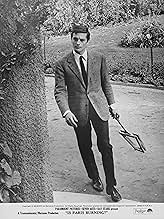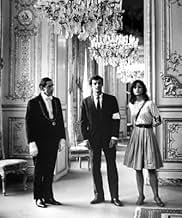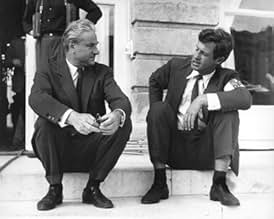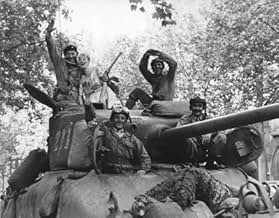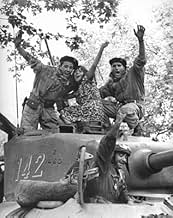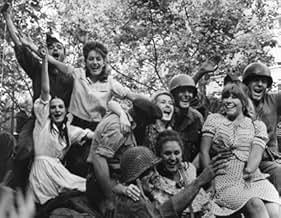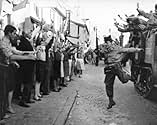August 1944. The Allies are approaching Paris and resistance groups within the city start to plan an uprising against the Germans. However, Hitler wants the city destroyed if it looks like t... Read allAugust 1944. The Allies are approaching Paris and resistance groups within the city start to plan an uprising against the Germans. However, Hitler wants the city destroyed if it looks like the Allies will take it.August 1944. The Allies are approaching Paris and resistance groups within the city start to plan an uprising against the Germans. However, Hitler wants the city destroyed if it looks like the Allies will take it.
- Nominated for 2 Oscars
- 4 nominations total
- GI in Tank
- (as Georges Chakiris)
- General Dietrich von Choltitz
- (as Gert Froebe)
Featured reviews
These events should, in theory anyway, provide sufficient material for a first-class movie, especially with René Clément at the helm.
In reality alas the film is a dud. One can try and find reasons. Personally I think it is down to a variety of factors: at a little under three hours it rambles; the newsreel footage is far more interesting and thrilling than the filmed action; there is an irritating mish mash of accents with some decidedly dodgy dubbing; there are too many writers and far too many famous faces. One critic at the time observed that the flames were extinguished by the shower of stars! The performance that stands out is that of Orson Welles as Swedish Consul Raoul Nordling, an unsung hero whose diplomatic relationship with von Choltitz assuredly influenced the latter's thinking. This relationship is very well depicted in Volker Schloendorff's film 'Diplomacy' with Niels Arestrup and Andre Dussollier as General and Consul.
The scene that really packs a punch is the sight and sound of the bell of Notre Dame which had been silenced for over four years. This is especially poignant in light of the recent fire that engulfed this monumental edifice. Clement has also included a rendition of 'La Marseillaise' which never fails to move. Needless to say the film was a tremendous success in France and Maurice Jarre's rather hurdy-gurdy 'Paris Waltz' theme extremely popular in its own right. Big budget plus well known actors equals great film? In this case decidedly not. Strange indeed that 'The Longest Day' which had no less than five directors, seems to work better than this with just the one. The real star of course is Paris itself.
In August, 1944, the Allies are closing in on Paris. Hitler (Billy Frick) orders General von Cholitz (Gert Frobe, "The Longest Day") to take command and burn the city to the ground to prevent its capture. French resistance forces within the city won't permit this to happen, and Swedish consul Nordling (Orson Welles, "The Battle of Austerlitz") convinces Choltitz to make multiple concessions, allowing the resistance to make significant gains and hold on until the armed forces arrive.
The all-star cast is uniformly good, although many of the American stars have little to do. Gert Frobe is the real star of the piece. As Cholitz, he makes a strong and sympathetic character. Cholitz has to make important, difficult decisions on one hand, he's concerned about his men's safety; on the other, he is trying to follow orders. Welles is somewhat engaging, but he disappears partway through the film without leaving a lasting impression. The script, by Francis Ford Coppola and Gore Vidal, combines several stories, allowing the host of characters little time to do much of anything. Gallois (Pierre Vaneck) and Dr. Monod (Charles Boyer) try to break out of Paris and reach the Allies; Colonel Rol (Bruno Cremer) and Chaban (Alain Delon) organize the resistance forces; Nordling and tries to free Francoise Labe's (Leslie Caron, "Father Goose") husband from a POW camp. It's hard for any of these subplots to make much on an impact, but like "The Longest Day" and "Battle of Britain", the characters are kept distinct enough that they are easy to follow, despite major time lapses between appearances.
The German characters are portrayed by a host of familiar character-actors. Helmuth Schneider ("The Dirty Heroes") plays a Sergeant who throws a pessimistic Corporal (Otto Stern, "Commandos") into a detention cell; Gunter Meisner ("The Bridge at Remagen") is his usual, evil self as an SS Officer in charge of a prison train; Joachim Hansen ("The Eagle has Landed") is a moral officer who tries to help Nordling gain concessions; Wolfgang Preiss ("Von Ryan's Express") has little to do as the commander of a demolition squad; and Karl-Otto Alberty ("Battle of the Bulge") is an SS officer. The American actors tend to have clunky cameos: Kirk Douglas ("In Harm's Way"); Glenn Ford ("Casablanca Express"); Robert Stack and E.G. Marshall are all limited to one or two scenes. Anthony Perkins ("Catch-22") and Skip Ward make more of an impression as infantrymen waiting to liberate Paris.
Clement handles every shot brilliantly. There are several standout scenes. One sequence has partisans ambush a German armored car. One soldier escapes, still smoldering from burns from an exploded Molotov cocktail. He proceeds to hijack a passing French car and make the driver take him to HQ, where his gruesome burns alert the neat-and-clean officers that something is not right in the city. The scene in which Francoise Labe searches for her husband amongst a throng of prisoners in especially moving, and the conclusion is brilliant and unexpected. In another scene, a French squad occupied an old woman's apartment to fire on a German barricade, as the old woman watches while preparing herself a cup of tea. In another scene SS officers arrive to secure a painting for Hitler's birthday from the Louvre, before Frobe burns down the city. Frobe informs them that the Louvre is in French hands, and they reply "But it's right across the street!" Without missing a beat, Frobe tells them to take a white flag over and see if the French will let them in. This grim humor and wit add to the human story within the big picture.
A lot of attention to historical accuracy and detail went into the film's production. Costumes, from French civilian dress to military uniforms are all accurate. The exteriors are beautifully shot in and around Paris, often with excellently staged wide shots showing off the narrow streets and just how vast and battleground was. The scenes of the French resistance gathering in the streets to march on the Police Station, set to Maurice Jarre's thundering, jovial score, are most memorable. The spirit of revolution and joy of liberation is so well-portrayed that you can feel it with the characters on screen.
"Is Paris Burning?" suffers from annoyingly bad dubbing, overlength and a lack of focus, but these are nicks in any epic film, and cannot be avoided in order to tell such a vast story. As its heart, "Is Paris Burning?" is a fine movie about human freedom, told with brilliance and gusto.
"Paris brûle-t-il?", a.k.a. "Is Paris Burning?", is an underrated French super production about the liberation of Paris in World War II. It is impressive the number of stars in this movie, directed by René Clément; screenplay by Francis Ford Coppola; music by Maurice Jarre. There are many cameos of great actors and also a huge number of bit players. Unfortunately the dubbing in English is awful. Fortunately this German general did not destroy one of the most beautiful cities in the world. My vote is eight.
Title (Brazil): "Paris Está em Chamas?" ("Is Paris Burning?")
Did you know
- TriviaOne of the main reasons for the movie being filmed in black and white: the French authorities refused to allow red and black Nazi flags to fly in Paris, even for a movie. They agreed only to the use of black and gray Nazi flags.
- GoofsJudging by Choltitz's own memoirs ('Soldat enter Soldaten", 1951) there never was an order to deliberately destroy Paris or its monuments. The orders concerned laming industrial plants, blowing bridges, crushing uprisings, and defending the town as a fortress, accepting collateral damage. Choltitz later found out these orders were addressed to his superiors, not to him. He does mention Hitler asking "Is Paris burning?" but says he was informed of this by others, whose names he does not give.
- Quotes
Lieutenant Henri Karcher: [over the phone to his father] Hello, Papa? This is Lieutenant Karcher. Your son. In spite of your pessimstic view of my military career, I'd like to announce I've just made some prisoners of the general in command of Paris at the Hotel Meurice. He surrendered to me. But I'm still very bad at drill.
- Crazy creditsThe end credit sequence is in color.
- ConnectionsFeatured in Magician: The Astonishing Life and Work of Orson Welles (2014)
- How long is Is Paris Burning??Powered by Alexa
Details
- Runtime
- 2h 53m(173 min)
- Color
- Aspect ratio
- 2.35 : 1

![Watch Bande-annonce [OV]](https://m.media-amazon.com/images/M/MV5BOWYyYzkwZTEtOTI4YS00NzFjLWI0ZmYtM2E1N2RiYTk2ZmNkXkEyXkFqcGdeQXRyYW5zY29kZS13b3JrZmxvdw@@._V1_QL75_UX500_CR0)
